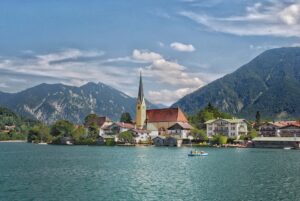The Importance of Self-Sufficiency
Self-sufficiency is a way of life that has been practiced for centuries by various cultures around the world. It refers to the ability to fulfill one’s basic needs without relying on external sources for assistance. This lifestyle is not only environmentally friendly but also promotes a sense of independence and resilience in individuals and communities. In today’s fast-paced and consumer-driven society, the concept of self-sufficiency is becoming increasingly relevant as people seek alternative ways to live more sustainably and in harmony with nature.
Lessons from Russian Villages
Russian villages are known for their self-sufficient way of life, where residents grow their own food, raise livestock, and rely on traditional skills to meet their daily needs. The harsh climate and vast distances between villages have historically forced Russians to be resourceful and self-reliant. These villages serve as a great example of how self-sufficiency can lead to a more sustainable and fulfilling lifestyle.
One of the key lessons that can be learned from Russian villages is the value of community support. Villagers often work together to build communal infrastructure, share resources, and lend a helping hand to one another in times of need. This sense of solidarity and cooperation is essential for maintaining a self-sufficient lifestyle and can help individuals overcome challenges that they may face on their own.
Another important lesson from Russian villages is the importance of traditional skills and knowledge. Villagers often rely on age-old techniques for farming, food preservation, and craftsmanship that have been passed down through generations. These skills are not only practical but also connect individuals to their cultural heritage and the land that sustains them. By preserving and passing on these skills, villagers can ensure that their way of life remains sustainable and resilient for future generations.
The Benefits of Self-Sufficiency
There are numerous benefits to living a self-sufficient lifestyle, both on a personal and societal level. Some of these benefits include:
Environmental Sustainability
Self-sufficiency promotes environmental sustainability by reducing reliance on fossil fuels, minimizing waste, and preserving natural resources. By growing their own food, villagers can avoid the environmental costs associated with industrial agriculture, such as deforestation, water pollution, and greenhouse gas emissions. In addition, self-sufficient communities often prioritize renewable energy sources and sustainable practices that help protect the planet for future generations.
Economic Independence
Self-sufficiency can also lead to greater economic independence for individuals and communities. By producing their own food, clothing, and other necessities, people can reduce their reliance on external suppliers and market fluctuations. This can help individuals save money, create additional sources of income through selling surplus goods, and build a more resilient economy that is less vulnerable to external shocks.
Health and Wellbeing
Living a self-sufficient lifestyle can have positive impacts on physical and mental health. By growing their own organic fruits and vegetables, villagers can ensure that they have access to fresh and nutritious food year-round. This can help reduce the risk of chronic diseases, such as obesity and diabetes, and promote overall wellbeing. In addition, the physical labor involved in maintaining a self-sufficient homestead can provide exercise and stress relief, leading to better mental health and a sense of fulfillment.
Challenges of Self-Sufficiency
While self-sufficiency offers numerous benefits, it also comes with its own set of challenges. Some of the key challenges include:
Time and Effort
Maintaining a self-sufficient lifestyle requires a significant amount of time and effort. Villagers must devote hours each day to tasks such as planting, harvesting, preserving food, and tending to livestock. This can be physically demanding and leave little time for other pursuits. In addition, the seasonal nature of farming means that certain tasks must be completed within a narrow window of time, adding pressure to an already busy schedule.
Knowledge and Skills
Self-sufficient living also requires a certain level of knowledge and skills that may not be readily accessible to everyone. Villagers must be well-versed in farming techniques, animal husbandry, food preservation, and other traditional skills in order to successfully provide for their own needs. This knowledge is often acquired through trial and error, as well as through the guidance of more experienced community members.
Conclusion
Self-sufficiency is a way of life that offers numerous benefits, from environmental sustainability to economic independence and improved health and wellbeing. By learning from Russian villages and other self-sufficient communities around the world, individuals can gain valuable insights into how to live more sustainably and in harmony with nature. While self-sufficiency does come with its own set of challenges, the rewards of a simpler, more connected way of life are well worth the effort. As we continue to face environmental, economic, and social challenges, the lessons of self-sufficiency provide a roadmap for building resilient and thriving communities for generations to come.





